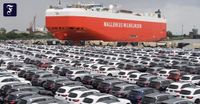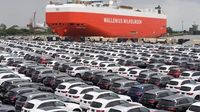In 2024, the German auto industry has seen a significant increase in the export of new cars, particularly to the United States, according to data from the Statistical Federal Office of Germany. However, this surge in exports arrives at a precarious moment, as President Donald Trump has expressed intentions to impose higher import tariffs on European cars, a move that could exacerbate the challenges already facing German manufacturers and suppliers.
The numbers reveal that around 3.4 million new cars, valued at €135 billion, were exported from Germany in 2024. This marks a 2.5 percent increase in export volume from the previous year, although the overall value of exports dropped slightly by 1.3 percent. Interestingly, exports of purely electric vehicles surged nearly 12 percent, reaching 881,000 units, accounting for about a quarter of the total exports.
The United States stood out as the largest market for these new cars, accepting 13.1 percent of the exports, followed by the United Kingdom at 11.3 percent and France at 7.4 percent. Despite this growth, total exports lag behind pre-COVID figures from 2019, when 3.5 million vehicles were shipped out.
As the automotive landscape shifts, it is crucial to note that approximately 1.8 million new cars were imported into Germany in 2024, which reflects a significant decline of 11.5 percent in volume and 12.8 percent in value. The current tariff for auto imports from the EU to the US sits at 2.5 percent, contrasting with the EU's 10 percent tax on US vehicle imports.
German automakers have expressed grave concerns about potential new tariffs, particularly a proposed 25 percent tariff on EU vehicles, which Trump has indicated could be enforced. Mercedes-Benz CEO Ola Källenius advocated for a reciprocal reduction of tariffs, stating, “Let’s bring these tariffs down to zero on both sides,” while stressing that additional US tariffs would be detrimental not only to Mercedes but to the entire industry. The threat of higher duties is daunting, especially considering that nearly every third Porsche and one in six BMWs sold in 2024 were in North America, while VW, Audi, and Mercedes-Benz each had a share of 12 to 15 percent.
Despite the establishment of significant production facilities in the US by VW, BMW, and Mercedes, a considerable amount of components are still imported from Europe. For Volkswagen, which has faced revenue declines due to increased costs and a downturn in exports to China, the outlook appears grim, with a nearly 31 percent plunge in profits noted recently. CFO Walter Mertl indicated that if import tariffs were to rise to the EU level of 10 percent, the company would face a sharp decline in profit margins.
The repercussions of escalating trade tensions could send shockwaves through the industry as well. The suppliers are not immune; ZF Friedrichshafen recently announced a billion-euro loss, illustrating the tightening grip of market pressures on German automotive suppliers.
As the trade conflict between the EU and the US continues to intensify, it presents a bleak landscape for the German car industry, already grappling with supply chain challenges and uncertain prospects for electric vehicle expansion. With further measures anticipated in mid-April, the coming months could be pivotal for stakeholders in this critical sector. As the world watches, how this all unfolds will determine the future of German auto exports and the industry's resilience in the face of rising tariffs.





